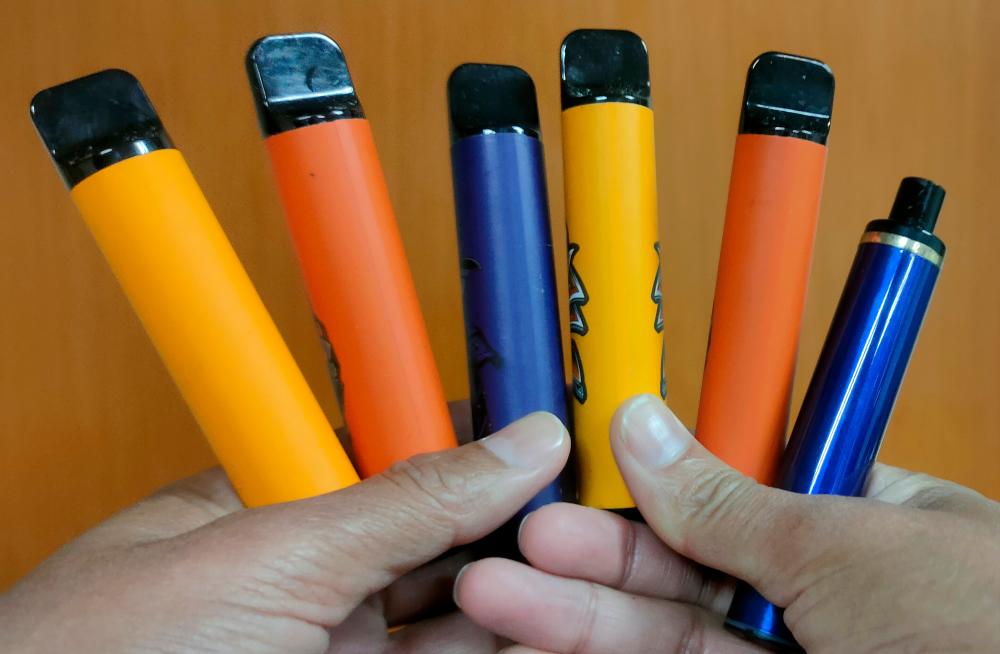PETALING JAYA: The failure of the government to impose a RM1.20 tax on vapes (electronic cigarettes) in 2022 has resulted in a loss of revenue of over RM860 million, and the amount of lost tax revenue could potentially hit RM1.12 billion by 2026 if the situation is not corrected.
Japan Tobacco International (JTI) general manager Khoo Beng Leng said Malaysia risks becoming a large illicit vape market, just like the current situation with illicit cigarettes.
She said because of a lack of control over nicotine levels and the ingredients in smuggled vape products, the public will not know exactly what they are smoking.
“The government, especially the Health Ministry, needs to introduce vape regulations to govern this segment and support revenue collection goals.
“The RM1.20 vape tax is only 10% of the RM9 tax the government imposes on cigarettes. The cheapest pack of cigarettes costs RM12. For example, five packs of cigarettes are equivalent to 800 puffs and cost RM60 while a single unit of disposable vape with 8,000 puffs costs just RM38.”
She said issue of concern over the of the lack of enforcement against vape is that sellers can give out free samples, while vape liquids, which are governed by the Poisons Act 1952, are widely available to the public.
Khoo said there is also no control over the product, ingredients, online sales or marketing. She said just as bad is that the government lost RM5 billion last year due to the illegal sale of smuggled cigarettes.
She said this is despite the quantity of smuggled cigarettes declining, although it is still over 50%.
“The increase in taxes since 2015, which was 43% that year, has merely shifted the consumption to illicit cigarettes, although the total volume sold has dropped by 3%. Meanwhile, the legal volume has declined by 33% since 2015, and it has been replaced by the illicit volume which has grown by 49%.
“The decline in volume was compounded by the increase in alleged substitutes such as vapes.”
She pointed out that an increase in taxes may not translate to higher revenue collection for the government as people would look for cheaper alternatives that are smuggled into the country.
As an example, taxes in 2015 went up by 43% but government revenue from the sale of cigarettes only increased by RM20 million.
Khoo called on the government to impose a moratorium on tax hikes for cigarettes while it takes action against smugglers.
She said the government needs to use all existing laws to fight smugglers. It could use the Security Offences (Special Measures) Act (Sosma), the Prevention of Crime Act (Poca) and the Anti-Money Laundering, Anti-Terrorism Financing and Proceeds of Unlawful Activities Act 2001 (Amla).
“It must be made too expensive and too dangerous for cigarette smugglers to continue their activities,” she said.
“The stricter transshipment controls introduced in Budget 2021 had led to a reduction in cigarette smuggling through ports in the country.
“The government should stick to these controls as it continues its fight against cigarette smugglers.
“The Health Ministry must ensure all those involved in the sale of cigarettes strictly adhere to its laws to prevent the growth of the illicit cigarette trade. Stepping up enforcement activities would be a big help.”
JTI Malaysia corporate affairs and communications director Saiful Bahari Mahpar said the Philippines government proposed a measure classifying cigarette smuggling as “economic sabotage” last year.
He said the penalties under that government’s Bill include a minimum of 30 years’ imprisonment but not exceeding 40 years, with no bail recommended against cigarette smugglers, who are also obliged to settle a fine double the value of the seized items, plus the total amount of unpaid duties, and other taxes.
Saiful Bahari said he was not implying that the same laws should be introduced in Malaysia, but the government could look at tightening existing laws to make it unprofitable to smuggle cigarettes into the country.









